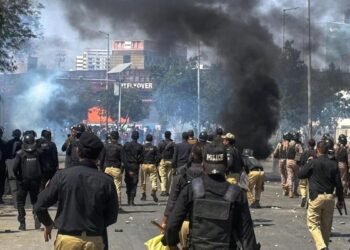As the Framework Agreement remains in limbo, the NSCN-IM has criticized India for incentivizingfactions and practicing double standards, which it claims hinder progress on the Naga political issue.
BY PC Bureau
The editorial in the latest issue of Nagalim Voice, the bulletin of the NSCN-IM (National Socialist Council of Nagalim-Isak-Muivah), has accused the Government of India of engaging in “political hypocrisy” in its dealings with the Naga people and warned that the organization may be compelled to seek support beyond India’s borders if the government continues its “wishy-washy” approach.
The editorial alleged that India has consistently employed insincerity and double standards, while the NSCN-IM has upheld the “truth of Naga history” to sustain its political struggle. According to a January 13 report in the Ukhrul Times, which often reflects NSCN-IM perspectives on key issues, the bulletin elaborated on the concept of political hypocrisy, describing it as “the conscious use of a mask to fool the public and gain political benefit in the most unsavoury and unhealthy manner.”
The bulletin accused the Indian government of dishonesty and deceit, claiming it seeks to equate the NSCN-IM with other surrendered factions to undermine its steadfast position on the Naga political issue. The NSCN-IM asserted that “hypocrisy” epitomizes India’s stance, while “truth” defines the NSCN-IM, which it describes as the spearhead of the Naga cause on behalf of the “God-given Naga nation.”
The NSCN-IM also recently stirred controversy by accusing the SP of Ukhrul of supplying arms to Kuki militant groups. It further alleged that the Central government has been providing “logistical and material support to Kuki militants,” including channeling millions of rupees to them in the past.
Criticizing India’s handling of the Naga issue, the editorial claimed that hypocrisy has obstructed the resolution of the conflict even after 27 years of dialogue. It accused the government of incentivizing factions and their rhetoric while neglecting the genuine aspirations of the Naga people. The bulletin also alleged that India sponsors the creation of factions to destabilize the NSCN-IM and weaken the Naga political struggle.
The editorial further criticized India’s interlocutors, accusing them of divisive tactics that have eroded trust among the Naga people. It also condemned the government’s approach to engaging with various Naga factions, claiming that many of these groups prioritize personal gain, including tax collection, over representing Naga aspirations.
“Significantly, the Government of India spent millions to sponsor the birth of factions, placing them within their ambit to force a wicked political equation to target NSCN. This is the crux of today’s messy situation created by India,” the bulletin asserted.
The NSCN-IM declared that the taint of hypocrisy has blocked the path for the Naga people to trust the Indian government. It accused India’s interlocutors of being “masters of deceit and deception” and employing a divisive approach to the Naga political solution. “Why cry foul against the Naga political groups for not coming together for ‘one issue, one solution’ when India is the devil behind the creation of many factions? Who else!” it added.
The organization called for an “alternative to political hypocrisy,” warning that the prolonged delay in implementing the Framework Agreement is pushing it to consider seeking support beyond India’s borders. “The NSCN dared to level ‘hypocrisy’ against India because that is the undeniable truth,” the editorial stated. “Rather, it is an indefensible truth.”
“What is inherently not right, we have to point out, as hypocrisy is politically wrongful and worthy of censure and criticism,” the bulletin continued. “No wonder the tide of the situation demands an exigent arrangement—an alternative to political hypocrisy—as the stakes to prolong the Naga solution based on the Framework Agreement grow bigger by the day, forcing the NSCN to look for help beyond the border,” it added.
The bulletin concluded by listing several reasons for its accusations, including lying, insincerity, self-deception, double standards, and a lack of integrity or political will, which it argued have become hallmarks of India’s approach to the Naga issue.













